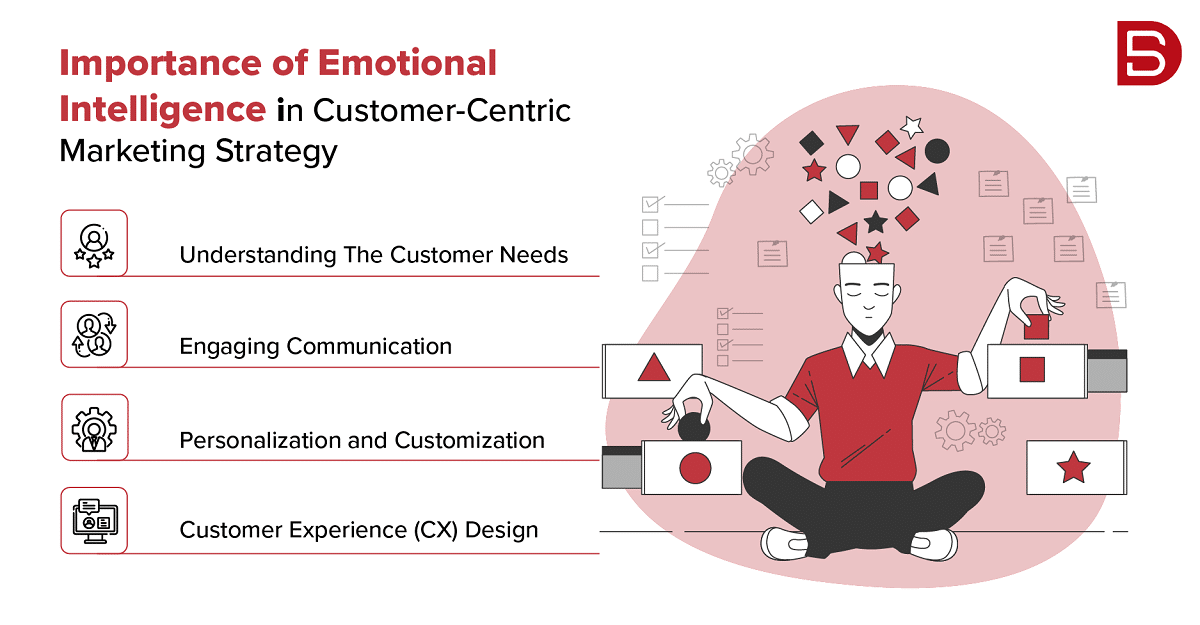Understanding Emotional Intelligence
Emotional intelligence (EI) in the context of the overall well-being of an individual can be defined as the ability to understand, recognize, and manage one’s emotions, as well as those around us. It essentially is the practice of expressing, regulating, and perceiving emotions so that the emotional information derived from it can be leveraged for thinking, behavior analysis, and decision-making. The information derived plays a significant part in one’s personal and professional success, as it directly impacts the emotional well-being of the individual.
In B2B marketing, Emotional intelligence (EI) isn’t too far from the definition we just learned. In the B2B marketing landscape, though, it refers to the ability of business professionals and marketers to leverage the emotions of their prospects in their interaction with them. Marketers still need to be able to perceive, understand, and recognize emotions. It requires the marketeer to be attuned to the emotional need and intent of B2B buyers. Understanding the emotions of the potential buyers allows the marketeers to tune their communication, forge stronger relationships, and drive fruitful marketing outcomes.
Importance of Emotional Intelligence in Customer-Centric Marketing Strategy
As a B2B marketeer, to fruitfully harness emotional intelligence in your marketing campaigns, you need to possess skills like understanding customer emotions, managing their expectations, and empathetic listening. These skills will allow you to effectively communicate and resonate with individuals from different walks of life and navigate some of the most complex situations with greater ease. Emotional intelligence allows the B2B marketers to create empathetic and compelling marketing messages, which in turn results in fostering trust and loyalty among the customers, drives higher engagement between the stakeholders and ultimately results in a higher success rate.
When creating a customer-centric marketing strategy, emotional intelligence must be kept at the epicenter of it, for it will help in development and successful execution of your customer-centric marketing strategy. Here are some reasons why emotional intelligence is so important in developing a customer-centric strategy:
- Understanding The Customer Needs: Emotional intelligence helps the marketers understand the customer desires, needs, and pain-points at the deeper level. This allowing them to empathize with customers and tailor marketing messages and experiences that best resonate with the customers.
- Engaging Communication: Emotional intelligence allows marketers to incorporate the emotions in their messaging and thus create more engaging communication. This evokes the desired response from the customer and thus helps them build trust.
- Personalization and Customization: Emotional intelligence enables personalization and customization in marketing efforts by giving the marketeers an insight into the need and preference of the customer. This consequently increases the likelihood of conversion and repeated business.
- Customer Experience (CX) Design: Using emotional intelligence marketeers can design customer experiences, which elicit positive emotions from the customer and give them fulfilling experiences. This drives brand advocacy and creates loyalists among your customers.
Applying Emotional Intelligence to Customer-Centric Marketing Strategy
For marketers to successfully apply emotional intelligence in marketing, they need to carve a customer-centric marketing strategy that focuses primarily on leveraging and understanding customer emotions. Here are some fundamental principles and practices that you must include to apply emotional intelligence in marketing:
• Build Empathy and Customer Understanding
While it is essential for your marketing message to carry the brand, it needs to resonate with your customers. Thus, it would help if you leveraged storytelling techniques to address your customers’ emotional desires and pain points on an emotional level.
• Create Messaging to Evoke Emotions
Every brand these days has a wealth of customer data sitting in their CRMs. Leverage all this customer data to derive insights and build personalized experiences for your brand. It’s worth mentioning that personalization goes way beyond the customers’ names; if you can, you must understand their preferences using their purchase history and behavior and create offers, content, and recommendations accordingly.
• Build Personalized Experiences
Assess the company’s lead generation methods and qualification process. Inquire about the sources they use to generate leads and how they ensure the leads meet your criteria. Understanding the company’s approach to lead quality will help you evaluate its ability to deliver valuable prospects.
• Foster Authenticity and Trust
Ensure you demonstrate authenticity in your marketing efforts. Thus, try to be as honest and transparent as possible with your marketing communications. This will help you build a sense of emotional connection and trust between you and your customers.
• Constantly Measure and Adapt
You must leverage analytics and customer feedback to measure the effectiveness of your marketing campaigns. There are tools that can help you track metrics such as sentiment analysis, customer satisfaction, and customer loyalty to gauge the overall effectiveness of your emotional intelligence-driven strategies. Use the insights to tweak and refine your marketing approach constantly.
• Foster Emotional Connections
To engage with the customers thoroughly, you must have touchpoints to engage them throughout their journey. These touchpoints evoke positive emotions, reinforcing the connection between your brand and your customers. Some practical ways to do so include having personalized welcome messages, dedicated support, and memorable moments explicitly carved for each customer based on their needs.
Key Elements of a Customer-Centric Marketing Strategy using Emotional Intelligence
When building a customer-centric marketing strategy, it’s critical to prioritize the customer experience, customer needs, and even their preferences. Here are a few critical elements of a customer-centric marketing strategy using emotional intelligence in marketing:
• Customer Segmentation
Starting with marketing research is always a good start. It lets you understand your target audience better and create detailed customer personas. You can use these personas further to segment your customers based on their needs, behaviors, and characteristics.
• Map Customer Journey
Mapping customer journeys is a great way to understand their pain points through interaction with your brand. This gives you opportunities for improvement and areas to carve better customer experiences. You can use these insights for optimizing and personalizing each stage of your customer journey.
• Personalization and Customization
Leveraging customer data to carve personalized experiences through customized messages, content, and offers goes a long way in building relations with your prospects. It shows that you understand and care about your customers and are not afraid to go the distance to offer them special treatment.
• Open and Transparent Communication
Maintaining open and transparent communication with your customers is highly recommended. You should always be open to feedback and prompt in responding to their queries. Use as many channels as possible, such as social media, email, chatbots, etc. to maintain healthy communication with your prospects.
Conclusion
Building a customer-centric marketing strategy with emotional intelligence can benefit businesses by allowing them to understand the emotions of their customers and thus engage with them on a deeper level. It allows them to create personalized experiences and foster lasting customer relationships, brand advocacy, drive loyalty, and attain sustainable business growth. The above points can be good starting points if you aim to embrace emotional intelligence in your marketing campaigns. These will help you strengthen your relationship with your customers and keep you ahead of the competition in the modern customer-driven marketplace. If you want insights or data to shape your customer-centric marketing strategy, kindly write to us at: marketing@datamaticsbpm.com, and we will help you get started with great ease.
 Select an element to maximize. Press ESC to cancel.
Select an element to maximize. Press ESC to cancel.
Somnath Banerjee


